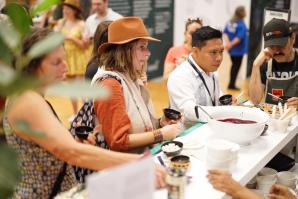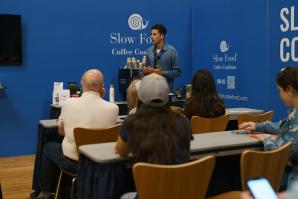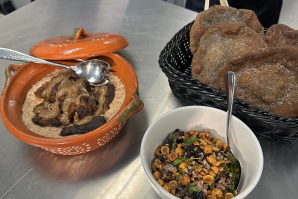A big international food festival inspired by the slow food movement debuts in downtown Sacramento this week (Sept. 26-28), bringing celebrity chefs and prominent food industry professionals to California’s capital city. The three-day event in and around SAFE Credit Union Convention Center is expected to attract thousands of people to downtown Sacramento and may help make the city a year-round culinary destination — as it did for a relatively sleepy city in Italy three decades ago.
The global slow food movement began in the 1980s, sparked by a street protest against the first McDonald’s in Rome. Out of that protest came Slow Food International, an organization whose motto is “good, clean and fair food for all.” In the mid-’90s, the group hosted its first Terra Madre food conference, Salone del Gusto (Italian for “taste exhibition”). It is now Europe’s largest food conference, attracting more than 300,000 festival goers every two years to Turin, Italy, and turning that city into a year-round tourist destination for foodies.
Terra Madre Americas will have informational booths on food and
agriculture, like these at Terra Madre Salone del Gusto in Turin
in 2022. (Shutterstock photo)

In 2019, Visit Sacramento CEO Mike Testa began talking with Slow Food International executive Paolo di Croce about bringing Terra Madre to California’s capital, with a focus on the food cultures of the Americas, from northernmost Canada to the tip of South America. In jockeying for the hosting gig, Visit Sacramento got a jump on potential competitors such as New York, San Francisco and Los Angeles, sewing up the rights to the every-other-year event for a decade. (Sacramento will hold the festival, called Terra Madre Americas, in odd-numbered years, Turin in even-numbered ones.)
At the 2024 conference in Italy, Testa ran into American colleagues who were surprised to learn about the decision. “I could see it dawn on their faces” when they heard that Sacramento had secured the prize, he says.
Di Croce was won over by Visit Sacramento’s robust marketing of Sacramento as an agricultural center and locavore paradise. In the 13 years since the Sacramento Convention & Visitors Bureau (later renamed Visit Sacramento) began marketing Sacramento as America’s Farm-to-Fork Capital, the city has reaped reams of publicity in national outlets such as The New York Times, Travel & Leisure and The Wall Street Journal. During that time, attendance at the Farm-to-Fork Festival on Capitol Mall grew from 20,000 attendees its first year to 100,000 attendees in 2024.
The 2024 Farm to Fork Festival, shown here, was the last to take
place under that name. This year the event will be called Farm to
Fork at Terra Madre Americas, and the name will eventually be
retired. (Shutterstock photo)

“Our Farm-to-Fork resume was a big seller,” Testa says. “That resume played well, especially from a farming and agricultural standpoint.”
Testa estimates the cost to produce Terra Madre Americas this year at $3 million, with much of the money coming from corporate sponsors such as UC Davis Health, Bank of America, Wilton Rancheria and SMUD. The convention center’s 160,000-square-foot ground floor has been divided into four large exhibition spaces with exhibitor booths, stages and gathering spots where chefs, producers, farmers and others can hold demos, tastings and panel discussions. Live musical acts will perform nearby, in the parking lot behind Torch Club at 14th and I streets. Entrance is free to almost all Terra Madre events.
Last year’s scaled-down Terra Madre Americas event featured
educational panels and booths focusing on slow food. (Photo
courtesy of Visit Sacramento)

A few things, however, will cost. On Friday evening, there will be a Grand Tasting at $125 per ticket, with small bites made by chefs from Hawks, Omakase Por Favor, Kru and other local restaurants. During all three days of the festival, a pop-up restaurant, Terra Madre Americas Bistro, will serve three-course lunches and dinners prepared by a revolving cast of chefs from the Americas, with $55 tickets (now sold out), plus an optional $20 wine pairing. (Celebrity chef Jeremiah Tower will do a shift Sunday, Sept. 28, from 11 a.m. to 12:30 p.m.)
An area dubbed Marketplace will sell local and international food products, and a large wine bar, Enoteca, will offer more than 125 wines from U.S. and South American producers. Just outside the convention center, vendors will sell food and beverages throughout the weekend.
Because it already had a well-established profile with locals, the Farm-to-Fork Festival kept its name and a minimal web presence this year but was “folded in” to Terra Madre. In the future, the festival will disappear entirely, replaced by Terra Madre as the city’s marquee food event. The pricey and popular Tower Bridge Dinner, a signature of the original festival, will never go away, Testa says, but will have its own date on the calendar, separate from Terra Madre. Legends of Wine, held on the West Capitol steps as part of the Farm-to-Fork Festival, broke off this year as a stand-alone event.
The iconic Tower Bridge Dinner, shown here in 2023, will continue
to take place in Sacramento annually even after the Farm-to-Fork
Festival transitions into Terra Madre. (Shutterstock photo)

Over the past 13 years, Visit Sacramento has played a long game to put Sacramento on the map as a food destination city. Its food-and-ag marketing efforts included vigorous lobbying to get Michelin Guide to create a California guidebook that includes Sacramento. Terra Madre Americas is the last piece of the puzzle. City boosters expect it will bring in visitors from around the world eager to spend money at local hotels and restaurants. And not just during the biennial festival but all year long. That’s what happened to Turin, which leveraged its Terra Madre event into a reputation as one of Italy’s leading cities for food tourism.
Earlier this summer, Juan Barajas, owner of Woodland’s Savory Cafe and head of the Slow Food Yolo chapter, spent six weeks in New York City and upstate New York as an ambassador for Terra Madre Americas. With the fest less than three months away, most of the chefs, farmers and food artisans he met said they couldn’t make it this year. That’s OK, Barajas informed them; he’s planting seeds for the future.
Organizers admit Terra Madre Americas will start small and grow as its name and reputation spread. Visit Sacramento hired New York PR firm Praytell to promote it, and Testa has talked it up on food-industry podcasts and Zoom calls with influencers like food writer Ruth Reichl. Starting an international event from scratch is a complex endeavor, says Sacramento restaurant and slow food advocate Bobbin Mulvaney, comparing it to assembling a plane while flying it. Testa agrees, saying, “It’s going to take some time to build this new thing.”
What is Terra Madre? Who is it for? And why should you go?
Terra Madre is many things to many people. It’s a food conference. A cultural festival. An homage to heritage foods and practices. An educational event. An assembly of food professionals. A meeting ground for policymakers and thought leaders. A crossroads for people of different backgrounds. A place to eat and drink.
Michael Franti sings with his audience during his concert at the
2023 Farm to Fork festival. (Shutterstock photo)

According to Kris Reid, executive director of Slow Food USA, it’s all that and more. “It’s a gathering of the slow food movement,” she says, “where stories can be shared, ideas sparked and connections made that will drive the movement forward.”
If your interests tend toward the wonky, you can attend panel discussions on subjects such as Adding Value and Expanding Access to Fair Markets for Agro- and Sociobiodiversity Products. If celebrity chefs are your thing, Alice Waters, Jeremiah Tower and “Sioux Chef” Sean Sherman will take the stage. You can taste freshly pressed apple cider, courtesy of a 1,500-pound apple press operated by Slow Food Russian River. You can also learn about the terroir of coffee, catch a cooking demo or hear musical acts such as the Grammy Award-winning band The War on Drugs. And it’s all free.
Ed Roehr, owner of Sacramento’s seasonal-and-local restaurant Magpie, attended his first Terra Madre in Italy almost 10 years ago on a scholarship from Sacramento’s Slow Food chapter, staying in a dormlike apartment an hour outside Turin. While commuting to and from the city by bus, he met a young Indigenous chef: a then-unknown Sean Sherman, who went on to win three James Beard Awards and was named one of Time 100’s most influential people in 2023.
“I’ve run into him a few times since then,” says Roehr, who now co-leads the Slow Food Sacramento chapter. “And every time I do, I think wow, we were both on that bus on scholarship.” He pauses, then adds, “You don’t know who you’re going to run into or how much fun it’s going to be.”
–
Subscribe to the Comstock’s newsletter today.
Recommended For You

Vino Madre
Juicy scenes from the wine tasting room at the first Terra Madre Americas
For three days in May, the floor of the Memorial Auditorium was transformed into a global foodways classroom where one could sample coffee from Honduras, eat a cookie made from Bolivian quinoa and spin an oversized wheel that directed you to pithy sayings by food journalist Michael Pollan.

Sacramento Goes Global With New Food Conference
Terra Madre has potential to shine a ‘huge culinary spotlight’ on the city
Sacramento will serve as the site of a prestigious international food conference that could eventually bring thousands of tourists and millions of dollars into the region.

Sacramento Becomes the ‘City of Cheese’
The 2025 American Cheese Society brings the creme de la creme of the dairy industry to Sacramento
The American Cheese Society’s annual conference took place last week in Sacramento, dubbed the City of Cheese for the occasion — the first time the California capital has hosted the high-profile event since 2014. It drew over 1,000 attendees with strong appetites for cheese talks and samples (lots of samples).

Visit Sacramento Unveils Menu for Tower Bridge Dinner
The annual dinner pays homage to the first Farm-to-Fork Festival at Terra Madre Americas
Ahead of Farm to Fork at Terra Madre, Visit Sacramento recently unveiled the menu for the Tower Bridge dinner, always an epicurean event. Get a preview here.

Can Sacramento Become a Tourist Destination?
Or will travelers always see it as a pit stop?
Often described by its proximity to other places, Sacramento actually sees significant traffic each year from out-of-town visitors. Here’s what draws them — and how the city is hoping to attract more.



